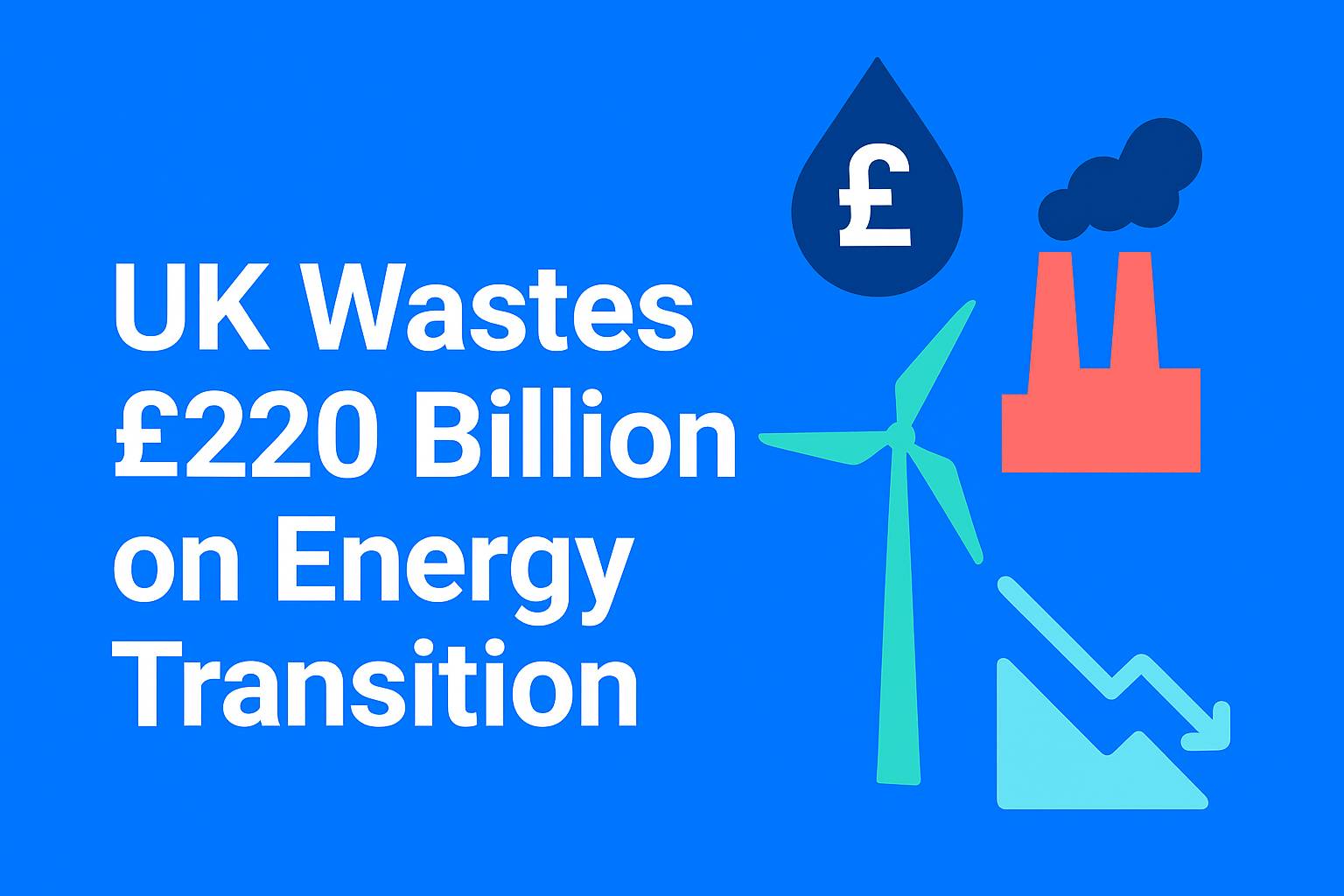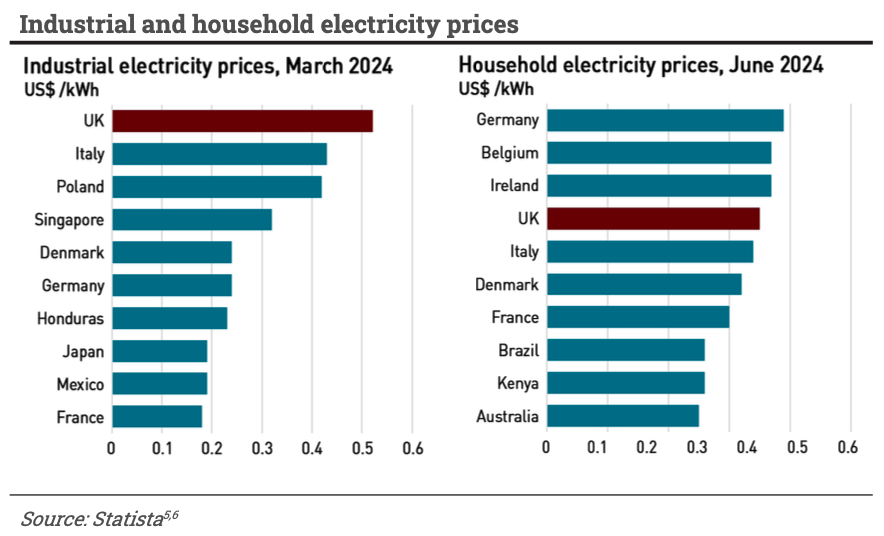The True Affordability of Net Zero Report, by Kathryn Porter…
According to Kathryn Porter, Energy Consultant at Watt-Logic, if the UK had not embarked on the energy transition in 2006 it would have saved £220 billion! Yes, you read that right. That is the price of having expensive renewable energy that only works a third of the time, is not reliable or dependable and requires constraint payments – that’s money wind farms get paid by the UK Government, or should I say energy bill payers like you, to NOT produce energy.
The UK’s energy consumers are literally paying twice for their electricity; once for the gas-fired power stations to produce the energy they use and then again to the wind farms to put the brakes on and stop, if they haven’t already, since they spend 65% of the time idle anyway. Imagine if the UK had instead decided to invest £11 billion per year in funding tech startups, and the impact that would have had on the economy? Well, I did imagine this very question, followed by some dodgy man maths and came up with an answer.

About Kathryn Porter
Kathryn Porter is an independent energy consultant, and recently published an industry-defining report titled “The True Affordability of Net Zero.” The document critiques the economic viability of renewable energy policies in the UK, arguing that they lead to high electricity prices and require ongoing subsidies, ultimately questioning the feasibility of achieving Net Zero carbon emissions by 2050 without significant costs to consumers. Her company is called Watt-Logic and you can find out more at the website link below.
Fruit and Nut-Zeros
If the UK government truly cared about the future of this union, its economy and the prosperity of its citizens, I wager it would make very different decisions. One of those decisions, fuelled by nothing more than a rabid insanity, instead of logic and purpose, is to pursue the goal of Net Zero. Which is quite ironic, because if the UK were to achieve Net Zero, the direct impact on the global climate will indeed be a net figure of about zero. The impact of this policy is that the UK now has the highest industrial electricity prices and the fourth largest consumer electricity prices in the world.

The Labour government has made fatuous claims of turning the UK into a leader in Artificial Intelligence (AI). However, by making technology and AI innovations integral to the Net Zero agenda, this will have the opposite effect, as economic growth and high energy prices are completely incompatible. AI, like many industrial processes, is energy intensive and therefore relies on the availability of reliable and inexpensive electricity; thanks to Net Zero, the UK has neither.
Had the powers that be not squandered billions of taxpayer money on expensive renewable energy projects over the last 20 years, everyone in the UK would be financially better off, and many jobs and businesses, especially in the manufacturing sector, would have been saved. Not only that, but if the UK government had the foresight, or any sight at all, to invest that money in tech startup growth projects, the economy would be in better shape than it is now. Exactly how much better? Let’s take a look.
20 Year UK Tech Startup Investment and Economic Benefits Calculation
Assumptions
- Total real investment = £220,000,000,000 (£220B).
- Period = 2006–2025 inclusive = 20 years, so annual deployment = £220B / 20 = £11,000,000,000 (£11B per year).
- Realistic estimated outcomes:
- Jobs created per £1M invested = 12 jobs per £1M
- GDP multiplier (cumulative output per £1 invested over time) = 3.0×
Step-by-Step Calculation
- Annual investment: £220,000,000,000 ÷ 20 = £11,000,000,000 per year.
- Number of £1M units funded: £220,000,000,000 ÷ £1,000,000 = 220,000 units of £1M.
- Jobs created (cumulative over the programme): 220,000 × 12 = 2,640,000 jobs (2.64 million).
- Cumulative GDP effect (simple multiplier on the £220B): £220B × 3.0 = £660B additional cumulative GDP.
- Annualised GDP uplift (spread evenly over 20 years): £660B ÷ 20 = £33B / year.
- Put that in UK-GDP terms (example baseline: UK GDP ≈ £2.5 trillion = £2,500B): £33B/yr ÷ £2,500B = 1.32% of GDP.
Economic Benefits Summarised
- Cumulative benefit: £660 billion additional GDP over the 20 years.
- Annualised benefit: £33 billion per year (1.3% of UK GDP at a £2.5T baseline).
- Employment: roughly 2.6 million extra jobs created over the period.
So, there we have it, this investment strategy could have added 1.3% GDP growth every year for the last 20 years. The UK Treasury would be salivating at the mouth, imagining the extra tax receipts the cumulative £660 billion would generate. This represents an example of what could have been done to advance the UK economy with a little bit of creative and progressive thinking. Instead, vast sums of money have been sunk into renewable projects that effectively starve the economy of abundant and affordable energy, making everyone poorer.
What developed economies need more than ever to compete internationally is abundant and cheap energy, and on that score, the UK has miserably failed. Worse still, there is a considerable risk that electricity generation, and the increasing volatility of the national grid that delivers it, is now less stable, reliable and dependable than ever before; a direct result of this policy, not despite but because of Net Zero investments.
Comparison With 20 Years of Net Zero Investments
Alleged Positive Impact
- Jobs Created in Renewables and Supply Chains
Estimates suggest around 250,000–300,000 UK jobs have been supported by renewables (construction, operations and maintenance, manufacturing, consultancy).
- Domestic Industry
Offshore wind has become a global UK strength, attracting export opportunities and investment. However, being good at something that doesn’t work 65% of the time and causes severe environmental consequences is nothing to be proud of.
- Energy Security
Renewables reduce reliance on imported fossil fuels, helping the balance of payments. However, this completely ignores the fact that more electricity now needs to be imported from Europe to meet peak demand, due to unreliable renewables. And has everyone forgotten about North Sea oil and gas?
- Innovation Spillovers
Some of the R&D and supply chain skills cross over into other advanced engineering fields. A claim so vague, it can hardly register.
- Ballpark GDP Boost
Estimated to be around £8–10B per year in added activity – but as we will see, this benefit is totally wiped out by the negative impact of expensive energy.
Negative Impacts
- Higher Energy Prices
Subsidies were funded through consumer energy bills and taxation.- Studies suggest UK households have paid in the region of £15B extra per year on energy bills due to green levies, subsidies and infrastructure costs.
- Reduced Industrial Competitiveness
Energy-intensive industries (steel, chemicals, manufacturing) have been disproportionately hit.- The result is plant closures, lost competitiveness, and “carbon leakage” (production shifting overseas).
- Possible GDP drag: £12–15B per year.
- Lost Jobs
Some tens of thousands of industrial jobs were lost due to higher costs, with knock-on effects in local economies.
The Net Outcome
If we balance the positive and negative forces:
- Positives
+£8–10B GDP per year (renewables jobs, exports, innovation, security).
- Negatives
−£12–15B GDP per year (higher energy costs, lost competitiveness, closed businesses).
- Net Effect
Between −£3B to −£7B per year drag on GDP.
Economic Impact Summarised
Over 20 years, the cumulative NET LOSS is estimated to be £60–140B, even before considering opportunity cost (what else £220B could have achieved).
A Summary of the Net Zero Affordability Report
Porter’s report argues that the transition to Net Zero energy in the UK is leading to higher electricity costs for consumers, contradicting claims of cheap renewable energy.
- Policymakers assert renewables are cheap, but the UK has the highest industrial and fourth highest domestic electricity prices in the developed world.
- High electricity prices are attributed to policy choices supporting renewable generation and the Net Zero target by 2050.
- Since 2006, consumers would have been £220 billion better off with a gas-based power system, even considering the gas crisis.
- The average load factor for wind energy is only 35%, leading to reliance on gas and other dispatchable generation.
This report is very detailed, revealing and informative; it’s a must-read for every energy bill payer in the UK. Download the full report at the link below.
The Painful Truth
The painful truth is that subsequent UK governments have consistently treated the public not as citizens but as revenue streams. Every year, the UK Treasury doesn’t consider how it can improve efficiency or do more with less; it only has one objective: increase tax receipts. The government treats taxpayers like cash cows and is always busy thinking of new ways to extract more, rather than making the hard, long-term decisions that will grow the economy. The £220 billion spent on Net Zero projects hasn’t been about grassroots wellbeing or economic prudence so much as political optics, crazy ideology and industry favours. Ordinary people continue to pay the price through soaring energy bills, shuttered local businesses and fewer opportunities for wealth creation.
High energy costs are the death knell of UK manufacturing, transferring more competitive advantage and UK wealth straight into the hands of lower cost producers like China. While this makes the UK appear to be producing fewer carbon emissions, it is, in fact, increasing them if you factor in the more accurate and appropriate consumption calculation. By outsourcing manufacturing to countries that use more polluting methods of energy production and then importing those goods back into the UK, we multiply the global carbon production many times over.
It’s time to stop this madness. Where is the political leadership that puts the long-term prosperity of the economy and its people ahead of their own personal short-term political career and financial gain? The time of financial scams, dressed up as policy schemes, that do nothing but impoverish the population must be put to the sword once and for all. The so-called sovereignty voted for in Brexit clearly wasn’t for the people but for the privileged classes that make and profit from these perverse and regressive rules.
The mismanagement of UK resources will ensure energy bills remain the most expensive in the world and almost guarantee that blackouts will become a regular occurrence in the future.
- Read the full report HERE
- Visit the Watt-Logic website HERE
- Watch insightful Kathryn Porter interview below:
You may want to read: “2025 State of B2B Pipeline Growth Report – Summary”







